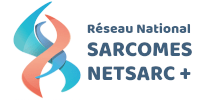24th March 2020
French Sarcoma Group proposals for management of sarcoma patients during COVID-19 outbreak
N Penel1, S Bonvalot2, V Minard3, D Orbach4, F Gouin5, N Corradini6, M Brahmi7, P Marec-Bérard6, S Briand8, N Gaspar3, C Llacer9, S Carrère10, A Dufresne7, A Le Cesne11, JY Blay7.
- Medical Oncology Department, Oscar Lambret Cancer Center, Lille University, Lille, France
- Surgical Oncology Departement, Institut Curie, Paris, France
- Department of Pediatric Oncology, Gustave Roussy Institute, Villejuif, France.
- Department of Pediatric Oncology, Institut Curie, Paris, France
- Department of Surgical Oncolgy, Centre Léon Bérard, Lyon, France
- Department of Pediatric Oncology, Centre Léon Bérard, Lyon, France
- Medical Oncology Department, Centre Léon Bérard, Lyon, France
- Surgical Oncology Department, CHU Kremlin-Bicêtre, Paris, France
- Radiotherapy department, institut du cancer de Montpellier, Montpellier, France
- Department of Surgical Oncology, institut du cancer de Montpellier, Montpellier, France
- Department of Medical Oncology, Gustave Roussy Institute, Villejuif, France.
Key-words : sarcoma, management, COVID-19
Declaration of interest: None.
Funding: This research did not receive any specific grant from funding agencies in the public, commercial, or not-for-profit sectors.
Regarding the COVID-19 outbreak, we propose an adaptation of current recommendations for clinical practice.
Patients with suspected COVID-19 should be screened for the presence of the virus. If confirmed or highly suspected (clinically or CT-scan), any treatment must be postponed at least 15 days after the start of the symptoms and when the patient has recovered.
Multidisciplinary tumor boards remain at your disposition for virtual discussion. Contact the manager of your local MDT.
Localized sarcoma
- ESMO [1-3] Clinical Practice Recommendations apply without modification for patients without of COVID-19 symptoms.
- Do not delay surgery for operable patients without COVID symptoms: Grade 2-3 soft tissue sarcoma, bone sarcoma, GIST and visceral sarcoma.
- In the case of high-risk surgery (retroperitoneal sarcoma): ensure postoperative resuscitation capacities.
- Radiation therapy for soft tissue sarcoma should not be delayed.
- For soft tissue sarcoma, neo-adjuvant chemotherapy should be reserved for patients who are inoperable or in whom the only possible intervention is mutilating. Also discuss preoperative radiotherapy, depending on location and histological type.
- Ewing and Osteosarcoma Sarcomas: Maintain neo-adjuvant and adjuvant chemotherapy regimens, without modification for patients without symptoms of COVID-19 infection.
- Alveolar and embryonic rhabdomyosarcoma: maintain neo-adjuvant and adjuvant chemotherapy programs, without modification for patients without symptoms of COVID-19 infection.
- connective tumors with intermediate malignancy: favor active surveillance; in the event of progressive disease: favor an option without NSAIDs [4].
- For Gists at high risk of relapse, initiate adjuvant treatment with imatinib.
Advanced disease
- Soft tissue sarcoma: in the metastatic phase, first-line treatment remains chemotherapy with doxorubicin, with systematic growth factors:
- doxorubicin-dacarabazine if leiomyosarcoma with limited pulmonary metastases without extra-thoracic extension and accessible to chest surgery;
- doxorubicin-ifosfamide for other histologies with limited lung metastases without extra-thoracic extension and accessible to chest surgery
- Soft tissue sarcomas: 2nd-lien treatment and beyond may be prescribed according to practice recommendations: oral treatments (pazopanib, or even regorafenib) may be preferred to limit the movement of patients for non liposarcoma sarcoma. For liposarcomes: trabectedin or eribulin.
- GIST: the recommendations apply with imatinib and in the metastatic phase (then sunitinib and regorafenib)
- Bone sarcomas with metastasis at diagnosis: classical first-line treatment, e.g. VDC-IE for Ewing sarcoma
- Metastatic relapse of bone sarcoma: topotecan and cyclophosphamide for Ewing’s sarcoma; no standard of care for osteosarcomas (discuss anti-angiogenic treatment, e.g. regorafenib or pazopanib)
References
- Casali PG, Bielack S, Abecassis N, et al. Bone sarcomas: ESMO-PaedCan-EURACAN Clinical Practice Guidelines for diagnosis, treatment and follow-up. Ann Oncol. 2018;29(Suppl 4):iv79–iv95. doi:10.1093/annonc/mdy310
- Casali PG, Abecassis N, Aro HT, et al. Soft tissue and visceral sarcomas: ESMO-EURACAN Clinical Practice Guidelines for diagnosis, treatment and follow-up [published correction appears in Ann Oncol. 2018 Oct 1;29(Suppl 4):iv268-iv269] [published correction appears in Ann Oncol.
- Casali PG, Abecassis N, Bauer S, et al. Gastrointestinal stromal tumours: ESMO-EURACAN Clinical Practice Guidelines for diagnosis, treatment and follow-up. Ann Oncol. 2018 Oct;29 Suppl 4:iv68-iv78. doi: 10.1093/annonc/mdy095.
- Kasper B, Baumgarten C, Garcia J, et al. An update on the management of sporadic desmoid-type fibromatosis: a European Consensus Initiative between Sarcoma PAtients EuroNet (SPAEN) and European Organization for Research and Treatment of Cancer (EORTC)/Soft Tissue and Bone Sarcoma Group (STBSG). Ann Oncol. 2017;28(10):2399–2408. doi:10.1093/annonc/mdx323
